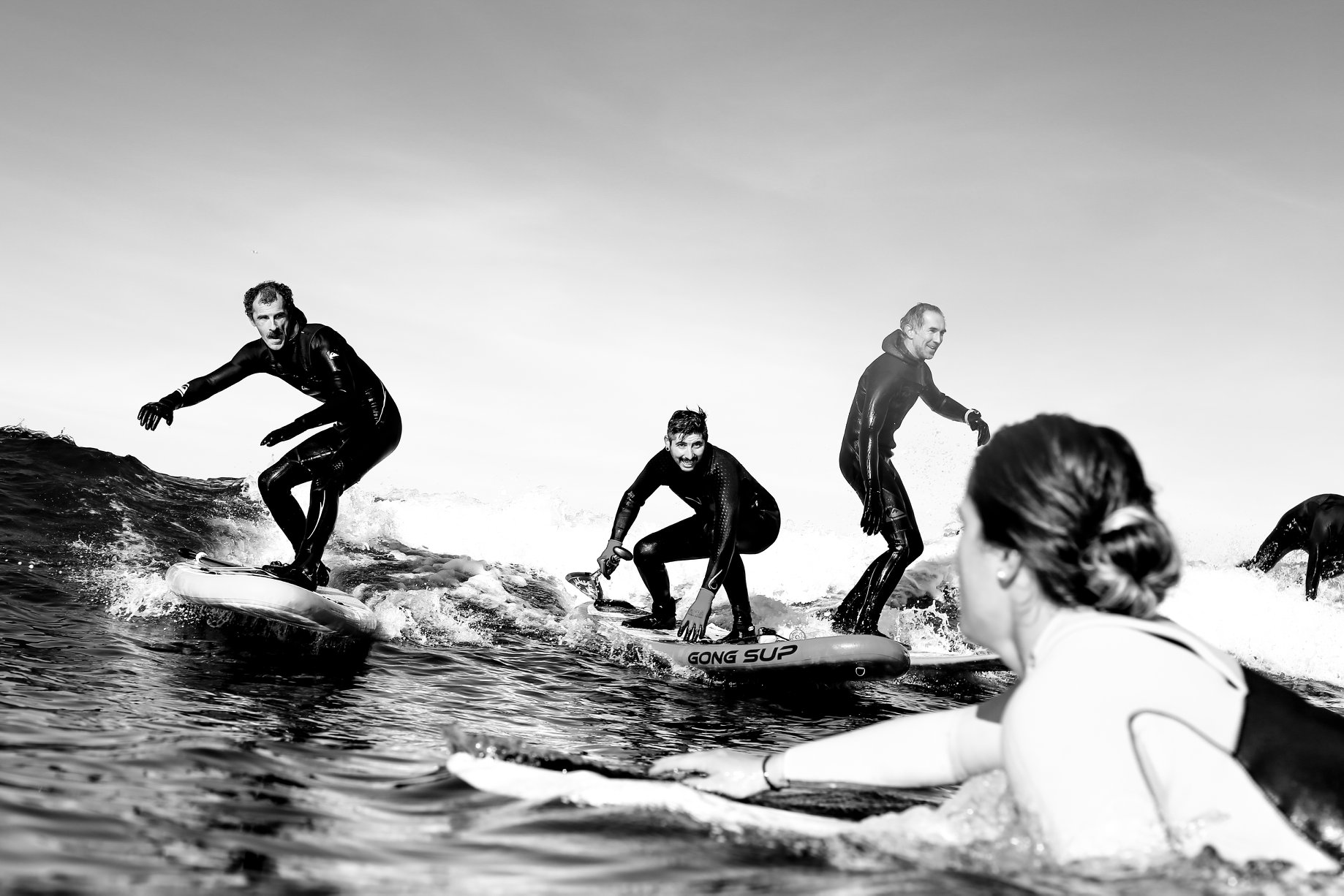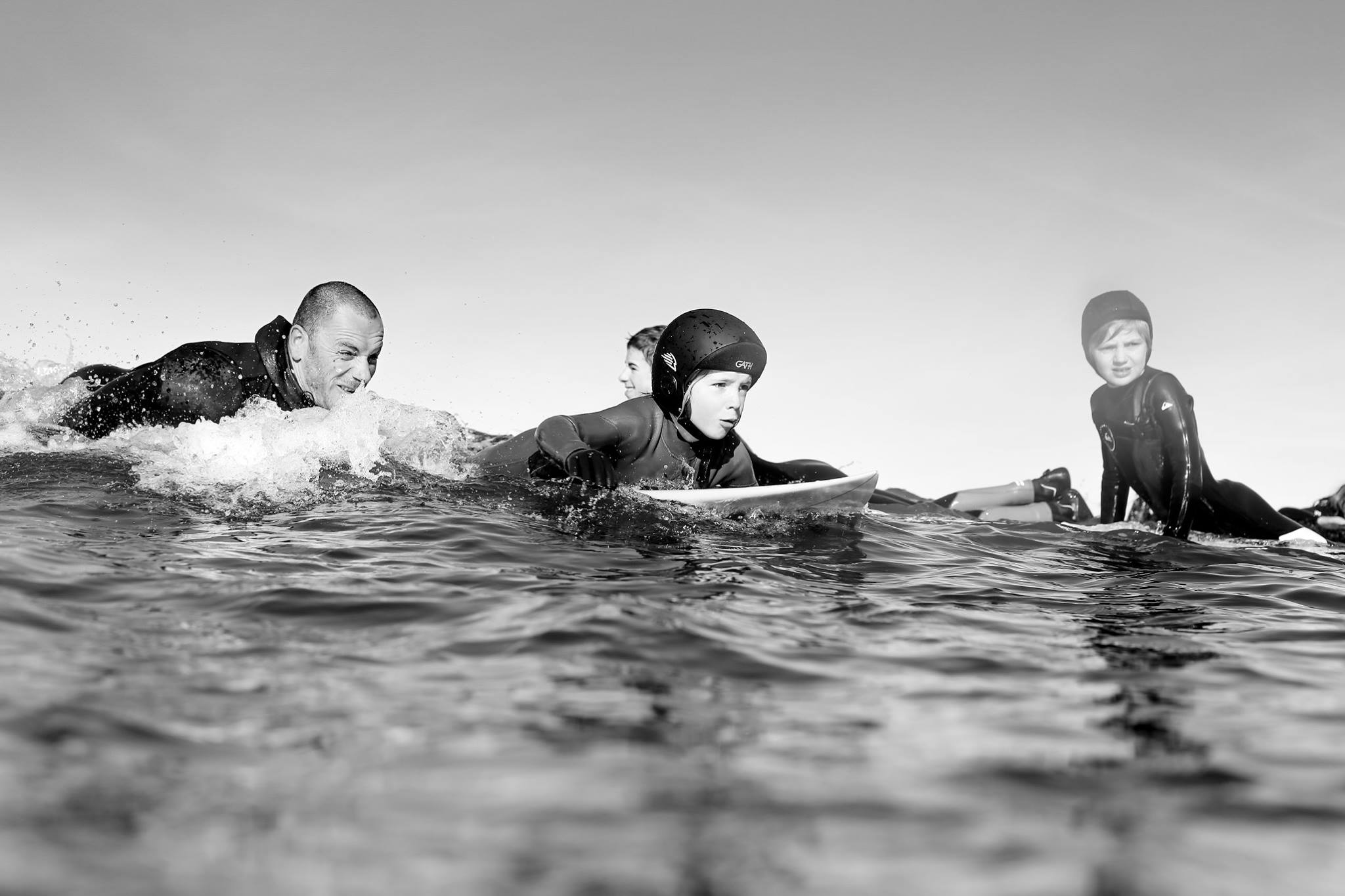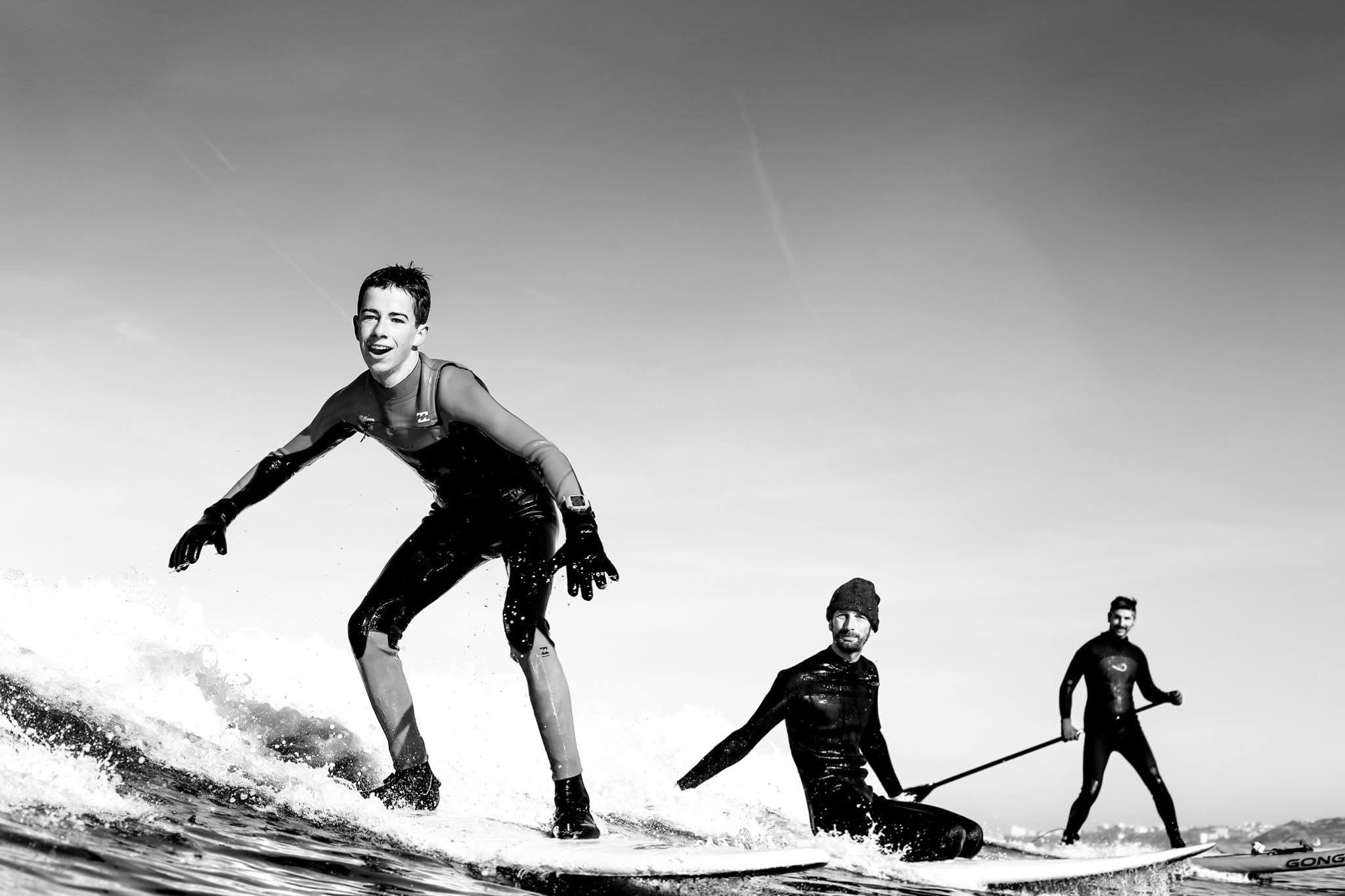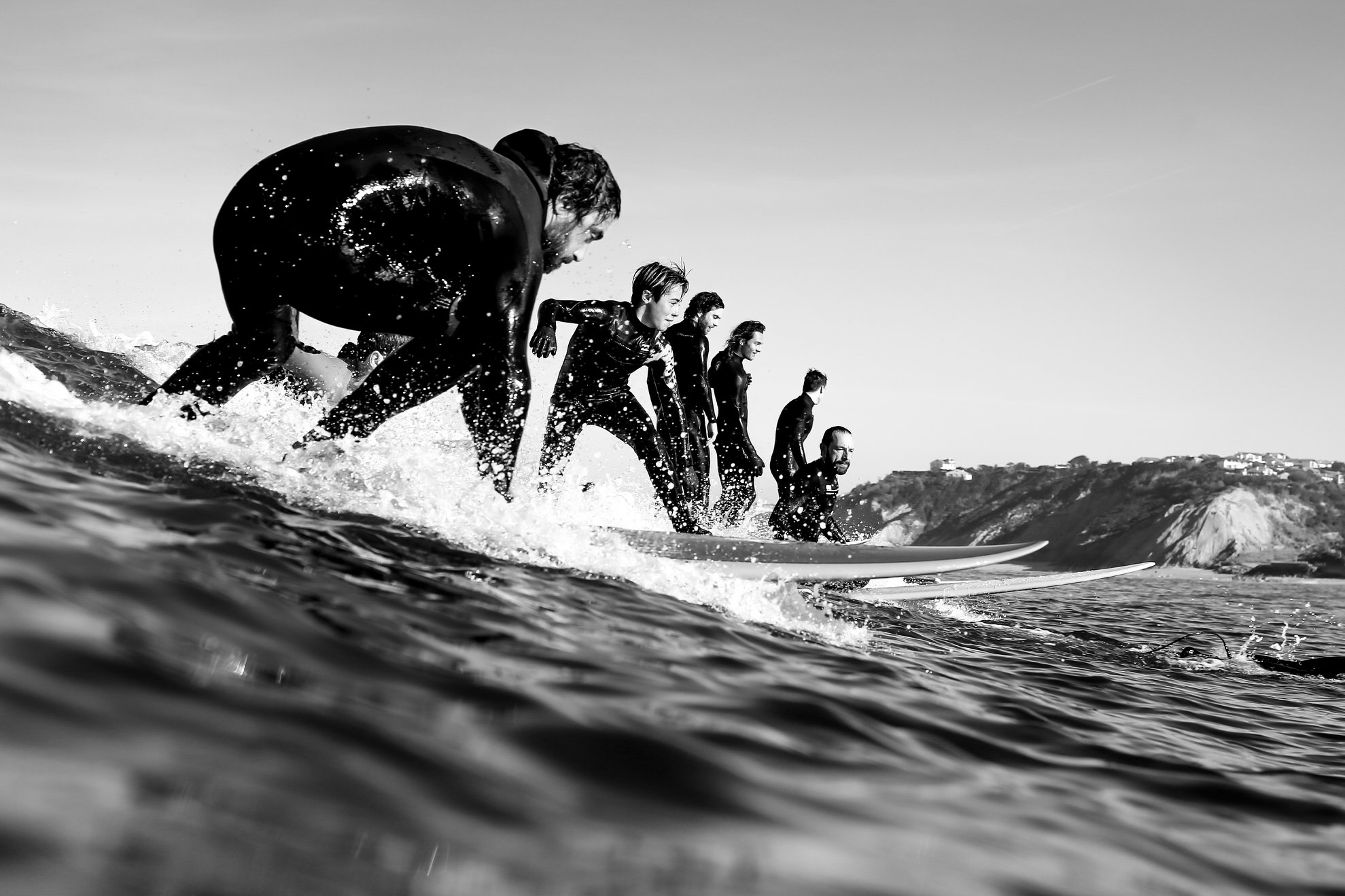Aloha in the lineup

‘Aloha’ is an intrinsic part of surf culture: it adorns T-shirts, bags and boards; it is sometimes sung in a silly voice and almost always accompanied by ostentatious shaka-throwing. Too often used as a strapline, a monogram or a loose greeting, Aloha has been emptied of its true meaning. We set off to experience the Aloha spirit, explore its origins and its ability to guide us beyond the lineup.
‘Wait, the whole hundred and fifty of us? On that single peak’? What could possibly go wrong?’
Aloha was the last thing on my mind as I tip-toed onto the small snowy beach in Guéthary’s harbour, manoeuvering my board between the hundred others that had somehow made their way down to the water line on this freezing January morning. Ice and patchy snow hadn’t managed to dampen the spirits of the hundred and fifty participants of Rame pour ta Planète, a surfers’ movement using the simple motion of paddling to change attitudes towards climate change, from awareness, to commitment and action.
The only artifacts of classic Hawaiian surfing were the high number of longboards, skies of the purest blue and a winter sun which could have passed for warm on photographs. After paddling out for the obligatory human chain photo opportunity, I turned around to notice half of the group frenetically paddling further out. ‘What are they doing? It’s flat as a lak…’ and then I noticed perfectly shaped 3-footers out at Parlementia a hundred meters to the right. As I started my own mad dash, it quickly dawned on me: ‘wait, the whole hundred and fifty of us? On that single peak’? What could possibly go wrong?’
Having experienced and witnessed too many instances of ‘aggro’ behaviour in the lineup, I am starting to believe that surf etiquette is failing in its role as a social conduct code. Enters Aloha.
Memories of what could go wrong flooded in. Strangely enough, I was less concerned by injury than by having to suffer the insults of short-sighted and short-tempered surfers eager to sacrifice anything and anyone to having ‘their’ wave (engaging in a conversation about whether the correct possessive determiner was applied can itself lead to direct injury). Parlementia is often classified as mellow compared to neighbouring spots such as Lafitenia, but I’ve heard more tales of fist fights on this spot than I have fingers to count them on. And there I was facing 300 potential fists. For the time being and as I always did, I sat on the shoulder, trying to assess the vibe.
I know my surf etiquette pretty well. And I know people will be arseholes regardless. Everybody usually understands the basics of ‘right of way’, but anything more refined very often goes amiss: snaking and dropping-in, wave hogging and the most fundamental principle of surf etiquette: having fun. Having experienced and witnessed too many instances of ‘aggro’ behaviour in the lineup, I am starting to believe that surf etiquette is failing in its role as a social conduct code. Enters Aloha. But what is Aloha you ask? If you are lucky enough, it is something you experience and then try to live by.
As I was sitting on the shoulder at Parlementia, watching 150 people self-organise to take waves, I realised something other than the traditional surf etiquette was providing a blueprint for their behaviour. Bearing in mind these surfers had all turned up to take action on climate change, their collective mindset was already in a different space. And though the lineup was unsurprisingly predominantly male, its set-up had more to it than met the eye.
First of all, a strong contingent of older surfers filled the ranks. Hawaiians refer to them as ‘kupuna’ . ‘Kupuna’ are not just elders, they are those in charge of preserving and passing on community values. And here as in traditional Hawaiian culture, the elders were highly regarded as local figures, early environmental activists, movement organisers, surf club owners nurturing new talent. Next were children, also known as groms or ‘Keiki’. Our sense of responsibility towards children was heightened by the morning’s focus on future generations and our duty of care towards nature. Then there were a handful of women, often dismissed as entertainment if not downright annoyance in a lineup, and here, somehow, celebrated as ‘Wahine’, holders of the ‘mana’ or spiritual power, enabling forces of every day goodness.
Add to this the exhilaration of having conquered the cold, experienced solidarity in what is bound to be a long climate battle, and suddenly the lineup opened up and provided to all according to their needs: massive party waves popped up and unfurled to shore, lit from above by the biggest smiles; pushing and pulling engineered to support rather than to destabilise; encouraging hoots, giggles at wipeouts or failed waves, cries of joy at sharing, never have I witnessed so many strangers visibly enjoying supporting each other, being grateful for the extraordinary opportunity of being able to stand on a wave, not as a lineup right, but as a privileged moment stolen from eternity.
In other words, these surfers had exemplified the spirit of Aloha without even knowing it.
It is a great testament to Hawaii’s extraordinary wisdom and self-awareness to publish words like ‘tenderness, gentle, humility and modesty’ in its statutes.
Auntie’ Pilahi Paki was a revered ‘keeper of Hawaiian secrets’ who in 1970 tasked several of her students to prepare for a future world collapse in the 21st century (how visionary that is to a climate change activist…). She spoke of the time when Hawaii would have the remedy, and the remedy would be Aloha (she knew we’d be f***ed, but at least she had hope, an early form of extinction rebellion). At a governor’s conference about modern Hawaii, she introduced a guide to the Aloha spirit she hoped would become law:
A - Akahai – meaning kindness (grace), expressed with tenderness;
L - Lokahi – meaning unity (unbroken), expressed with harmony;
O- ‘Olu‘olu – meaning agreeable (gentle), expressed with pleasantness;
H- Ha‘aha‘a – meaning humility (empty), expressed with modesty;
A- Ahonui – meaning patience (waiting for the moment), expressed with perseverance.
I first came across this story and acronym in Honolulu airport, and I was struck by its powerful simplicity and timeliness. I was struck by the use of words you don’t usually see anywhere near public documents, even less so legislation. And it did become law in 1986. It is a great testament to Hawaii’s extraordinary wisdom and self-awareness to publish words like ‘tenderness, gentle, humility and modesty’ in its statutes. Those who see it as a tool to neutralise native Hawaiian land claims are perhaps missing the last ‘A’, the epitome of successful non-violent resistance, exemplified in other cultures by the likes of Gandhi and Martin Luther King: patience, expressed with perseverance.
If activists who work on noble causes such as land rights, self-determination and freedom can live by the rules of gentleness, how come this becomes impossible when talking about wave priority?
When surfers start flexing their pecs and foaming at the mouth talking about respect and Aloha, I wonder, what next? Slapping your dick on the table to preach about the merits of PUBLIC DECENCY?
In Hawaii, I have surfed in places with the most extraordinary spirit of Aloha, with a lineup more diverse than anywhere else I’ve been: brown, black, white, graceful big girls cross-stepping and drop-kneeing, big old men oscillating between bullish cutbacks and childlike tricks, dads pushing groms, couples on tandems, all sharing the same waves with the same smiles I have since experienced at ‘Rame pour ta Planète’. But I have also witnessed some of the worst behaviour there, where young and often older men use ‘Aloha’ as a threat, ‘respect’ as an empty concept that only applies one way: theirs. Surfers who demand that you drive your tiny car into the ditch so that their white SUV can sail through the tight pass (true story) or surfers who simply hog every single wave and use all the tricks in the book of intimidation to prevent anyone from challenging them.
It is sad that some surfers who claim to be the guardians of the original Hawaiian surf culture have zero understanding of Aloha, one of its founding principles. Aloha has the merit of being highly adaptable, a template for all situations, whereas surf etiquette is sometimes so rigid that surfers have come up with an endless list of exceptions leaving everyone often unclear and unhappy. When other Hawaiian luminaries expanded on what Aloha meant, they added: ‘Aloha is an action, not a reaction. It is a natural response of respect, love and reciprocity, and not a contrived series of expressions that have to be rehearsed and perfected. Aloha is a way of life, a mindset and an attitude’.
So when surfers start flexing their pecs and foaming at the mouth talking about respect and Aloha, I wonder, what next? Slapping your dick on the table to preach about the merits of public decency? You cannot talk Aloha without being Aloha. Its simplicity exposes the frauds for what they are. And it goes further to remind us of the intrinsic beauty of the world’s interconnectedness described in all religions, but most vividly in Buddhism. ‘Aloha is to be in the presence of life, to share the essence of one’s being with openness, honesty and humility. It is a commitment to being real. It is a commitment to accepting others and giving dignity to who they are and what they have to offer. Aloha is a spiritual principle that conveys the deepest expression of one's relationship with oneself, the creative and life-giving forces, one's family and community, and with one's friends and strangers.’
The Hawaiian statutes close with the following article on the Aloha Spirit: ‘In exercising their power on behalf of the people and in fulfilment of their responsibilities, obligations and service to the people, the legislature, governor, lieutenant governor, executive officers of each department, the chief justice, associate justices, and judges of the appellate, circuit, and district courts may contemplate and reside with the life force and give consideration to the "Aloha Spirit". [L 1986, c 202, §1]’.
One can start dreaming what the world would look like if all politicians, business and nation leaders lived by the Aloha Spirit. In the meantime, as surfers and guardians of a rich culture and environment, it is up to us to show the way.
📷: Greg Moyano shooting for Rame pour ta Planète
Chief Storyteller at Swellbound








